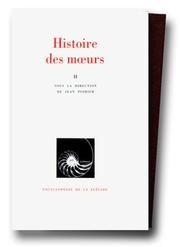| Listing 1 - 3 of 3 |
Sort by
|
Book
Year: 2019 Publisher: Liverpool University Press
Abstract | Keywords | Export | Availability | Bookmark
 Loading...
Loading...Choose an application
- Reference Manager
- EndNote
- RefWorks (Direct export to RefWorks)
La France est une nation légère - ce lieu commun antique est abondamment repris tout au long du XVIIIe siècle, témoignant de profonds bouleversements axiologiques, scientifiques et éthiques, dont ce volume collectif cherche à mesurer l'importance et les enjeux, en racontant l'histoire d'un autre siècle des Lumières : celle d'un siècle de la Légèreté.Propre aux représentations que le XVIIIe siècle français construit de lui-même, tant par rapport aux siècles qui l'ont précédé que dans une logique de parallèle entre les nations européennes, la légèreté du XVIIIe siècle est un important paradigme de l'historiographie qui s'est constituée sitôt après la Révolution. Les héritiers du XVIIIe siècle ne reconnaissent pas seulement en lui l'âge de la raison et du progrès, des Lumières et des droits du citoyen, mais éprouvent aussi tantôt du mépris, tantôt de la nostalgie pour la prétendue légèreté de ses mœurs, la futilité de ses goûts ou la frivolité de ses enfantillages. Entre la bourgeoisie industrieuse du XIXe siècle tirant profit des représentations voluptueuses des fêtes galantes et l'intérêt de notre époque célébrant l'aimable frivolité du siècle de Marie-Antoinette, le XVIIIe siècle en sa légèreté n'a jamais cessé de séduire certes, mais aussi de questionner le récit progressiste de la raison et de l'utilité dans la définition des valeurs qui fondent notre communauté.Aussi importe-t-il d'interroger les conceptions et les valeurs qui sont associées à la notion de légèreté au XVIIIe siècle, de manière à mieux comprendre dans quelle mesure elle a pu être associée à la fois au caractère de la nation française en général et au XVIIIe siècle en particulier. --- The age-old cliché that France is a light-hearted nation is echoed repeatedly throughout the eighteenth century and bears witness to the deep axiological, scientific and ethical upheavals which this volume explores. By analysing the importance of, and issues at stake in, these transformations, the articles gathered here tell the story of another age of Enlightenment: the story of an age of lightness.Lightness is at the crux of how the French eighteenth century represents itself both in contrast with previous centuries and through parallels between European nations. The concept of lightness therefore constitutes an essential paradigm of the historiography that developed immediately after the French Revolution. The intellectual heirs of the eighteenth century do not only find in this period an age of reason, progress, Enlightenment and citizens' rights; they also feel, at times, contempt, at other times, nostalgia for the alleged lightness of its mores, the futility of its taste or the frivolity of its childish ways. Between the industrious bourgeoisie of the 19th century exploiting the voluptuous representations of fêtes galantes and the fascination of our own 21st century for the delightful frivolity of Marie-Antoinette's era, the 18th century in its lightness has never lost its charm. Yet, crucially, it also challenges the progressive narrative of the history of reason and usefulness in the definition of the very values on which our community is built.It is therefore essential to analyse the concepts and values associated to the notion of lightness in the 18th century. Such an approach yields breakthroughs in understanding why, and to what extent, this idea of lightness has been related to the French national character in general as well as, more particularly, to its 18th century.
identité nationale --- légèreté --- Rococo --- dix-huitième siècle --- histoire des sciences --- Eighteenth century --- histoire des mœurs --- historiographie --- Siècle des Lumières --- morale

ISBN: 2070110648 2070112004 2070112012 9782070112005 9782070112012 9782070110643 Year: 1991 Volume: 48 Publisher: Paris: Gallimard,
Abstract | Keywords | Export | Availability | Bookmark
 Loading...
Loading...Choose an application
- Reference Manager
- EndNote
- RefWorks (Direct export to RefWorks)
#SBIB:39A1 --- #SBIB:17H16 --- 39 --- 930.86 --- 930.86 Mentaliteitsgeschiedenis --- Mentaliteitsgeschiedenis --- Antropologie: algemeen --- Cultuur en ethiek --- Inventions --- Utopies --- Livres --- Savoir-vivre --- Moeurs et coutumes --- Image du corps --- Rire --- Éducation --- Stratification sociale --- Sexualité --- Histoire. --- Histoire --- Manners and customs. --- Mœurs et coutumes. --- Mœurs et coutumes --- Histoire des mentalités --- --Histoire des moeurs --- --Manners and customs --- Manners and customs --- Ceremonies --- Customs, Social --- Folkways --- Social customs --- Social life and customs --- Traditions --- Usages --- Civilization --- Ethnology --- Etiquette --- Rites and ceremonies --- Histoire du livre. --- Histoire des moeurs
Book
ISBN: 9782221104231 2221104234 Year: 2009 Publisher: Paris: Laffont,
Abstract | Keywords | Export | Availability | Bookmark
 Loading...
Loading...Choose an application
- Reference Manager
- EndNote
- RefWorks (Direct export to RefWorks)
Marriage --- Mariage --- History --- Histoire --- --Histoire --- --Histoire des mentalités --- --Histoire des moeurs --- --History --- -392.4/.5 <09> --- Married life --- Matrimony --- Nuptiality --- Wedlock --- Love --- Sacraments --- Betrothal --- Courtship --- Families --- Home --- Honeymoons --- Verloving. Huwelijk. Huwelijksgebruiken. Partnerkeuze. Polyandrie. Polygamie. Monogamie--Geschiedenis van --- 392.4/.5 <09> Verloving. Huwelijk. Huwelijksgebruiken. Partnerkeuze. Polyandrie. Polygamie. Monogamie--Geschiedenis van ... --- Verloving. Huwelijk. Huwelijksgebruiken. Partnerkeuze. Polyandrie. Polygamie. Monogamie--Geschiedenis van ... --- 392.4/.5 <09> --- Verloving. Huwelijk. Huwelijksgebruiken. Partnerkeuze. Polyandrie. Polygamie. Monogamie--Geschiedenis van .. --- Verloving. Huwelijk. Huwelijksgebruiken. Partnerkeuze. Polyandrie. Polygamie. Monogamie--Geschiedenis van . --- Marriage - History --- Histoire des mentalités --- Histoire des moeurs
| Listing 1 - 3 of 3 |
Sort by
|

 Search
Search Feedback
Feedback About UniCat
About UniCat  Help
Help News
News